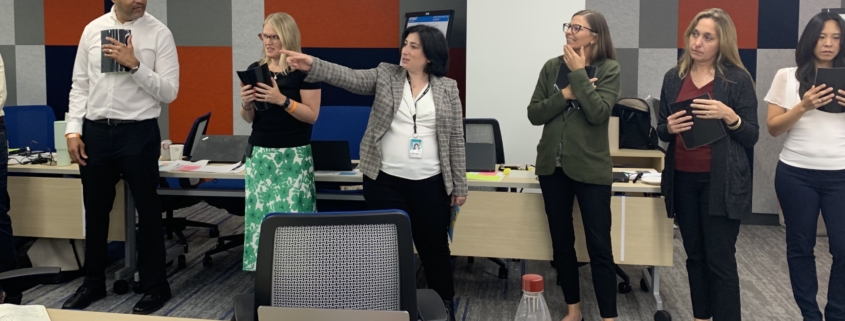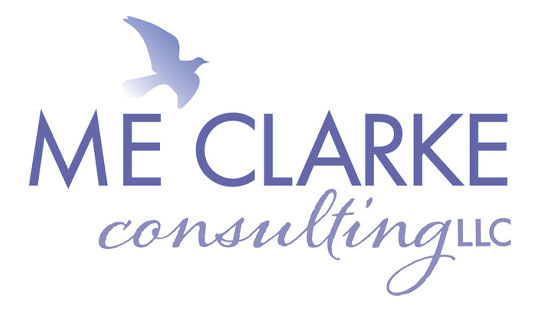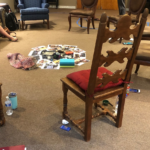
There is nothing like honest feedback from peers and stakeholders you respect to spark an internal journey of transformation. This was Liz Liss’ experience in October of 2020 when she received the results of her 360 assessment. She was shocked to hear many folks she respected and looked up to (literally and figuratively) within Merck were looking for her to show up more fully in her role: to participate, take up space, and interact with them as a peer. This feedback was a wakeup call to Liz to lean into her leadership in a different way. She knew she was good at what she did, and now it was time for her to show up in her capacity authentically and fully as a leader.
As anyone knows about a 360, it tells all the truths of how we are being experienced. While those above her were looking to her to show up more confidently as a leader, her team’s feedback was she could be too harsh and needed to show more vulnerability. Liz found herself staring down a bit of a conundrum: being asked to simultaneously soften and strengthen. A journey of learning to balance humility with confidence was beckoning. She began to see that vulnerability is our only direct measure of courage and that this journey was going to take her to her growth edges, again and again.
The Journey with her Peers
In her leadership role at Merck, Liz had to embrace the confidence to see herself as others saw her – a senior leader who belonged at the table, had a vision, and was capable of leading. The journey was not without the power dynamics inherent in any complex organization: Liz is a VP, and at the time the table was made up of Senior Vice Presidents, most of whom were older than her, and few, if any, were women. As one of the only women at that level in a male-dominated science field, Liz was cautious not to slip into doubts about her own abilities, intelligence, or sense of belonging. Through coaching with Meghan, Liz was able to talk through challenges, see alternative approaches and become more comfortable with feedback. One of the most valuable pieces she received through her coaching was (re)framing around what she was experiencing both personally and professionally. She began to recognize what she was fully capable of from the inside out. The external always reflects the internal.
By working through her limiting beliefs and stepping into her unique skills, expertise, and perspective, she began to step into and own her power. This growth became evident when she was asked for her opinion about a high stakes project and her perspective was different from Merck’s CEO. In the past she might have kept quiet, instead she trusted her gut and confidently bet on herself and her team offering a solution she knew they could deliver.
The Journey with her Team
In parallel to the journey with her peers at the leadership level, Liz was working on a different side of herself with her team: feedback to soften the edges and show more vulnerability. Liz was recently promoted, and the structure shifted away from a co-leader model. She felt as though she was walking a tightrope as a female executive, which demands women strike a delicate balance of being soft (but not too soft) and firm (but not too firm). Being off kilter in either direction comes with negative labels and consequences.
Liz traversed the tightrope through a personal exploration of what it truly means to be vulnerable on a team and as a leader. She initially viewed vulnerability through an emotional lens and pushed against it. In her own words, she is not warm and fuzzy. But she refocused her definition to the idea of being human. It means we are all on a learning journey and sometimes we get it right, and sometimes we do not. As she leaned into this side of vulnerability, she began to dig into how she was being experienced by her team and other junior employees, realizing as a leader she has incredible impact on those around her. She leaned into strength and compassion, balancing when and where to push people to bring out the best version of each one of them.
In parallel, she engaged MECC as a strategic partner in her leadership team’s (LT) development. Liz’s priority for her LT was a journey of empowerment: they were looking to her to lead, she was looking to them to lead. She understood that allowing her team to set the direction, activate, and execute together, would both amplify their effectiveness while freeing her up to have greater influence at the highest level of the organization. A key foundational pillar of the team development journey was to build the trust and other necessary behaviors – productive conflict, commitment, and peer-to-peer accountability to ensure the team is aligned around collective results. Without ownership and empowerment for decisions on the LT, Liz could sense the twinges of burnout and resentment beginning to build. While her team and her part of the organization were wonderfully collaborative, they skewed heavily toward the need for consensus. The burden of consensus is that it often leads to watered-down, mediocre decisions, a frustrating process, and a less than compelling direction.
This focus on accountability has helped her team turn the corner. Though she remarks that folks tend to view accountability as negative or heavy handed, she experiences it as reminding people who they truly are and shifting the onus of their experience back to where it belongs: within each one of them individually. She is creating opportunities for her team to chart the course and define the cultural tenets of the organization. The realization that the well-being of the whole lies within each of us. Leaders are often wary of telling the truth for fear that people will not like it, but without transparency, her leadership team and the whole of GPAM was deprived of crucial growth and development opportunities. She has seen how telling the kind truth has helped her develop the innate leadership on her team and beyond.
Through this journey her team has grown to a place she never imagined possible. It was not without its challenges and dark days. Not unscathed by the “Turnover Tsunami” there was a year of rampant turnover that made her question everything she knew as a leader. But she realized that great leaders are defined by how they respond to challenges. She leaned into it, called a town hall, and created space for deep dialogue with her people. She and her LT weathered the storm and are now poised to take the organization to new heights.
Transformation does not happen overnight. Through small pivots and a commitment to keep ‘showing up’, her team is not only high performing, they genuinely enjoy working together. Liz realizes some may think allocating budget toward team development work is “mushy” – in fact at one point she did too! She now realizes she greatly underestimated the power of a cohesive team. It was well worth the investment as she and her team perform at ever higher levels – leveraging the unique perspectives, styles, and talents on her team to get more of the right work done.
Photo: Liz Liss, third from left, stands with her team during a recent team development session.


